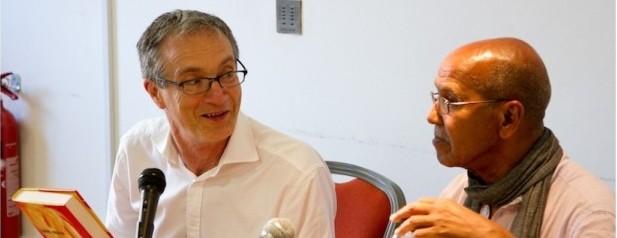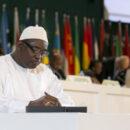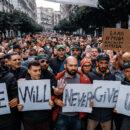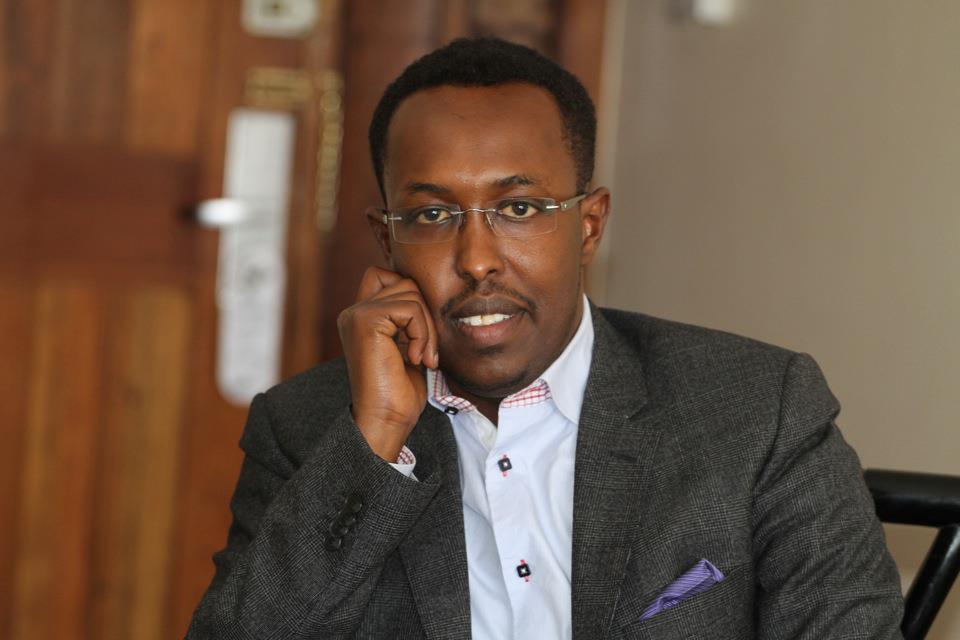Kenya and the ICC: “Don’t be vague, go to The Hague,” (but send Bush and Blair too) – By Richard Dowden

 This is a crucial moment for the International Criminal Court. If it drops the ball or the UN Security Council (UNSC) kicks the Kenyan cases into the long grass, the ICC is finished. At present the Court has agreed – reluctantly – to a postponement of the cases against President Uhuru Kenyatta and Vice-President William Ruto until February. Interestingly it has done so because the prosecutors did not object – they wanted more time to present witnesses. The Court did not believe that Kenyatta’s presidential duties were a reason to delay the trial.
This is a crucial moment for the International Criminal Court. If it drops the ball or the UN Security Council (UNSC) kicks the Kenyan cases into the long grass, the ICC is finished. At present the Court has agreed – reluctantly – to a postponement of the cases against President Uhuru Kenyatta and Vice-President William Ruto until February. Interestingly it has done so because the prosecutors did not object – they wanted more time to present witnesses. The Court did not believe that Kenyatta’s presidential duties were a reason to delay the trial.
African heads of government have denounced the ICC as disproportionately focusing on the continent. In terms of numbers, they are right. All eight current cases before the ICC are African. Four of them are at the request of the African governments themselves and two were begun with the full support of African governments. The other two were referred to the court by the UN Security Council. Of the seven other cases being investigated by the ICC two are African.
So what on earth were the African presidents going on about when they complained at their recent meeting in Addis Ababa that Africa was being unfairly targeted? This is a specious, self-serving argument that assumes they are above the law. I was shocked to see Mrs Nkosasana Zuma, Chair of the African Union, joining in. My question to them is where else in the world are atrocities happening and why aren’t you bringing them to the attention of the ICC? Syria? It is being investigated already.
Two other cases that seem to fit the Court’s mandate are George Bush and Tony Blair. Their illegal invasion of Iraq in 2003 based on false justification for war and the atrocities that followed are an obvious case for prosecution and would give the ICC profound and universal credibility. The fact is that, Iraq and Afghanistan excepted, the world’s most destructive wars and worst atrocities since 2002 when the Court was set up, have occurred in Africa.
The principle that no one is above the law must be total and universal. That is why the law is portrayed as blind: It does not matter who you are, everyone is equal in the eyes of the law. The ICC has already bent over backwards to accommodate President Kenyatta who stood for election with his former enemy, William Ruto, as his running mate, even though the charges had already been laid. And Kenyans voted for them in the knowledge they would be on trial. Most politicians faced with such charges would step aside to face justice and clear their names before standing for election. And the Kenyan parliament was given the choice: set up a special court in Kenya to try to instigators of the 2008 violence or send them to The Hague. The politicians voted to go to The Hague. “Don’t be vague. Go to the Hague” was the slogan adapted from the old whisky ads.
That shows that Kenyan parliamentarians did not trust their own courts or they believed that the ICC would never act. They were wrong. Now they must face the consequences.
Kenyatta and Ruto might also have argued that the selection of who should be charged was biased. They would have a point. The list was too balanced and neat to be an honest indictment of the major perpetrators – three from each side, three politicians, two public servants and one person from civil society. Two others, Mwai Kibaki and Raila Odinga, might also have been on it, but someone had to form a coalition to run Kenya after that terrible election. Very few Kenyan politicians from the main parties had completely clean hands. The charges against three of the original six have now been dropped leaving President Kenyatta, Vice-President Ruto and, somewhat incongruously, Joseph arap Sang, a radio announcer, facing justice.
Kenyatta and Ruto have asked for a year’s postponement and that will be decided by the Assembly of ICC member states at its annual meeting on November 20th. Having already agreed to a postponement, the Court itself will argue that there will be no more delays. So it will be up to the world’s politicians. They will have to judge whether Kenya is secure enough to run itself with occasional skype calls and emails from Holland, or whether it will chug along as usual. The stakes are very high, not least in Kenya itself where there will be weeks, months even, of daily reports of murder and mayhem committed in 2008 reported in the press. Knowing that little or nothing has been done for the victims, no effective programmes of return or resettlement for the displaced and no effective national policy of truth-telling and reconciliation, these revelations could be explosive.
Kenya is not just another African country. It is the gateway to East Africa, which South Sudan, Uganda, eastern Congo, Rwanda, Burundi, northern Tanzania depend on. Kenya is the main economic driver of the region with the most efficient banking sector and economy. It has been a key ally of the West in many ways, not least as a base for patrolling the Indian Ocean and training the UK and US armies in tropical conditions. What happens in Kenya has the potential to impact the lives of millions of people.
Richard Dowden is Director of the Royal African Society and author of Africa: Altered States, Ordinary Miracles published by Portobello Books.







“And the Kenyan parliament was given the choice: set up a special court in Kenya to try to instigators of the 2008 violence or send them to The Hague”
And therein lies the false dilemma/choice imposed by Annan,Waki, and ilk. Were there only two choices? How about if a referendum was to be held to let this matter of national importance be decided by Kenyans?
This case has a faulty foundation and the storms they-are-a-gathering, leaving a destroyed ICC in its wake.
Mark,
The Kenyan people did have a choice over this issue. The (very successful) Kofi Annan-led initiative to end the violence contained within it a number of principles.
These included paving the way to a new constitution and bringing justice.
The other thing about justice is that its enaction shouldn’t be decided upon by people, it should exist.
Further – referendum results in Kenya often follow which tribe people are from. The Uhuruto coalition, which covers just under half Kenya’s population (Kikuyu and Kalenjin people), would result in a farce of a referendum as political figures leveraged support, thereby distorting a key principal of justice which is that it should be reomved from politics.
See Michela Wrong’s ‘it’s our turn to eat’ for an example of Kenya’s underhand, and controlling, politics.
You are all more than welcome to read a paper I gave at the Royal United Services Institute for Defence and Security Studies (RUSI) on 27th March 2009 titled “Prosecuting Presidents: The Challenge of International Indictments of African Leaders.”
If you wish me to send it to you, please give me your email and I shall be happy to oblige.
Best regards
From
Millius
Richard says no one I above the law. That is true. So why is the ICC engaged in “race hunting” of African leaders? When we see western leaders who have committed genocide in countries around the world, and when the Prosecutors of the ICC does not behave as if they are above the law, then the ICC will be taken seriously.
I for one cannot imagine the leader of a western nation going before the ICC as it I happening t he Kenyan duo. At any rate, why are Western countries behaving as if they own the ICC (if it s a UN Court)? Deferring the case of the Kenyan duo as requested by he Africa Union is the best option for that ICC. This institution is in need o serious reform.
* The opinions expressed here are personal. Zaya does not represent any organisation or individual but himself).
Moreno Ocampo was not invited by anyone but himself on his own volition http://www.icc-cpi.int/iccdocs/doc/doc785972.pdf He inserted himself into the Kenyan situation and thus has short circuited any hope that true justice will ever be done for the many victims. Waki and Annan took names to Ocampo when it was not their mandate to do so by setting deadlines that were impractical to meet on matters of judicial reform. The Kenyan parliament did not do any such action, either by motion or resolution.
When the Kenyan cases are dispensed with through eventual acquittal due to their shaky foundation on theories of “networks” and “organizations”, coached and recanting witnesses, whose lies are constantly exposed through cross examination, it will be clear to all what a farce the cases have been.
Commenter Tom, like many who find it difficult to accept the democratic will of the people, only sees Kenya through tribal lenses as though all the voters who voted were from only two ethnic groups. If that were so, then why does the Kenyan Parliament and Senate also have a significant majority for the winning coalition, yet constituencies are distributed all across the country? Such sentiments as expressed by Tom are precisely the type of rhetoric that was used to launch the post-election violence in 2007 using the “41 against 1” mantra. It is the type of thinking and rhetoric that the ICC cannot cure by going after the wrong suspects. The leader of that mantra is not before the ICC, yet it was used to incite killers, looters, robbers and rapists. For justice to be effective it must be seen to be inclusive, the Kenyan people rejected the ICC’s brand of justice, in what was a virtual referendum in the 2013 election, that alone should send a powerful symbolic message that the ICC cases are a farce. Trial for the sake of trial will effectively mark the beginning of the ICC’s end but at what cost? Anyone watching the proceedings in DP Ruto’s case will have realized that the prosecution after 7 key witnesses is still unable to link the two accused with a smoking gun. When the witnesses lies start to be exposed during defence cross-examination, the judge is quick to switch the court to private session, why not let the world see the type of farce the cases are? Similarly prosecution witnesses under cross-examination have been allowed to read written statements to “jog their memory”. Such are acts only capable of being undertaken in a Kangaroo court.
When the people cease to believe in a judicial system, then it surely cannot bring justice to them. So to whom, does the ICC seek to bring justice to? Westerners and western powers obsessed with regime change? NGOs that created fictitious reports and coached witnesses? Kenyans had 6 years to think it over and realize the farce the ICC was engaged in. Kenyans did not see the Ocampo 6 personally attack them. Instead those who actually did so continue to live freely and in many cases live on the real estate they disposed the victims of.
The Kenyan cases will most likely eventually collapse and result in acquittal, assuming the judges are fair arbiters and not in cahoots with the prosecution. The current Presidingjudge and the prosecutor were lead prosecutor and assistant prosecutor respectively in Rwanda. In many courts, that would call for a recusal. The ICC depends on funding for its activities from western powers, and thus it is not inclined to bite the hand that feeds it, rather it is inclined to play the tune it is paid to play. A collapse of the Kenya cases will spell doom for the ICC. The conduct of the court thus far whenever lying witnesses are on the verge of being exposed for their lies reeks of a need to save the OTP rather than engage in an equal, open and public exercise of the administration of justice for all.
Are the cases being used as political manipulation tools? Indeed they are, as this leaked letter best exemplifies: http://i40.tinypic.com/ke6jb8.jpg
When a request was made to have the cases held in Arusha, Tanzania (location of the Rwanda Tribunal) or Kenya, it was rejected. When video conferencing as an option was sought, it was rejected. When continuous absence when presence was not required was sought it was rejected (the OTP has made it clear it will oppose future requests, the standard as set by the Appeals chamber makes it nearly impossible to attain). Numerous reasonable requests by the defence that would not constitute special treatment in any other court anywhere else have been rejected by the ICC. An intransigent court that acts in its own world of apolitical reality is bound to eventually collapse and fail. It may get away with the mischief of conducting a sham trial, where the real suspects are not before it, but it will have to bear the consequences of that outcome.
The ICC double standard at the behest of its western controllers was once again exposed when the ICC expressed confidence in Libya’s judicial system to try Senussi even though it has not had a judiciary for over 40 years, while rejecting Kenya’s request http://www.icc-cpi.int/iccdocs/doc/doc1050005.pdf to try the cases under its reformed constitution and judiciary. How does one explain the fact that Western members of the UN security council knew that Uhuru Kenyatta’s trial had been postponed to February before the ruling was made public for them to use that as a counter argument to council action?
When the real suspects are before the ICC, then justice can be said to be done, until then, it is only a mockery of justice that continues to take place at great cost to the victims, the Kenyan people and the accused.
“not least in Kenya itself where there will be weeks, months even, of daily reports of murder and mayhem committed in 2008 reported in the press.”
Wrong.
The Kenyan press has learned to mute itself on these matters. If we want the news, we will need the internet and international media houses. Not the Kenyan press. They are busy doing their ‘civic duty’ sugar-coating or ignoring un-pleasantries and out-right denying anything that might cause ‘disunity’ and more, new developments on the law-making front aimed at making the Kenyan press a mute one de jurre (although why we need a law when the Kenyan media is doing a sterling job in self-censorship since the macabre events of 2007 is beyond me) is underway.
but why should Africans, unlike everyone else, have to choose between freedom and justice?
whilst we are constantly lectured that the colonial project is over and the world is free and democracy expanding, we are confronted by the cold, hard fact that our sovereign dignity remains the reserve of a select untouchable few (with their own entrenched self-interests on African soil) that have the self-appropriated power to vote and veto as they see fit, every fate of every mortal in lesser places. That the highest body on African affairs must defer to such an ‘international’ ‘UN’ body is an affront to my dignity an African, an offense and a calculated and deeply humiliating assault on our recent hard-won political freedom on the continent, even before considering the merits of any claim. How can we meaningfully expand the plurality of the global voice when the UN continues to function in such an openly undemocratic and hegemonic fashion?! No. Even the UN seems to (as we say in Kenya) have its owners.
The violence in Kenya in 2007-8 was not in any way comparable in scale to what went on in Iraq (for which we vainly hope that justice will one day also be served) and the consequences today, of that invasion. The ICC has its work cut out trying to prove its credibility and usefulness. How victims’ interests can be served by a court so mired in historical baggage and the modern consequences of that baggage- the reality of a geopolitical imperial and racial pecking order that is not only fighting to retain its usual power privileges but seems to be rubbing salt to wounded spirits by predetermining what cases can be brought to the ICC and who can be tried- remains to be seen
plaquenil eye exam chloroquine pills what is hydroxychloroquine used for arthritis